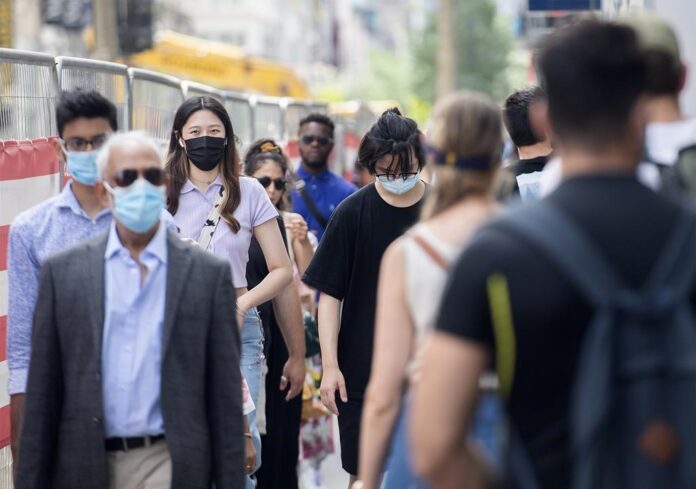Quebec on Monday appeared to be the only province ready to buck the Canadian trend and prolong its mask mandate, as experts said face coverings are still an effective tool to limit COVID-19 transmission.
Currently only Quebec, P.E.I. and Nunavut still require masking in public places, with the latter two scheduled to end their mandates within the next week.
Quebec’s interim public health director told Radio-Canada on Sunday that as the province battles a sixth wave of COVID-19, he is “seriously considering” recommending that masking remain mandatory beyond the planned mid-April end. Premier François Legault said a decision would be announced Tuesday, following a Monday evening meeting between government and health officials.
The province’s COVID-19 hospitalizations, which had dipped below 1,000 in mid-March, have been climbing steadily in recent days, reaching more than 1,400 on Monday.
Read more:
Montreal-based study estimates Quebec saw up to 32,000 new daily COVID-19 cases last week
Other provinces have resisted calls to prolong or reimpose public health restrictions, even as cases have risen in some parts of the country.
Ontario Premier Doug Ford said Monday that his province, which has seen a one-week, 30 per cent rise in hospitalizations, can manage what he described as a “little spike” in COVID-19. Ford said a combination of increased hospital capacity and the advent of antiviral drugs have left the province better prepared.
“We expected a little spike,” Ford said. “We said that over the last months, but that little spike, we’re being able to manage it.”
The Ford government has previously said it did not plan to reimpose public health restrictions.
Two experts who spoke with The Canadian Press said that while masking cannot fully stop a COVID-19 wave, it remains one of the best defences to cut transmission and protect the wearer and those around them.
McGill chemistry professor and aerosols expert Parisa Ariya said there are “hundreds” of studies that have shown that masks are successful in reducing transmission. While efficacy varies, she said, those studies have shown that the ability to filter out the virus ranges from about 50 per cent for three-layer cloth masks to more than 90 per cent for top models.
Trending Stories
3 dead after shootout, police chase at Mexican beach resort
Canada to punish ‘close associates’ of Russia, Belarus with new sanctions
“Many good masks actually work better than some of the Chinese vaccinations that were good up to 50 per cent,” she said in a phone interview Monday. “A very good mask can go to over 80 per cent, so that’s very good protection.”
She said there’s a simple reason why masks work against COVID-19, including the most recent mutations. “The major weakness of the virus is the fact that, it is a physical thing, it is a matter” that can be blocked by a physical barrier, she said.
Nearly all Canadian provinces have done away with mask mandates for public spaces in recent weeks, although some have maintained the order for schoolchildren or on public transit.
Despite keeping its mask mandate, Quebec was the first province to declare a sixth wave of COVID-19, and the province has seen a concerning rise in hospitalizations.
Ariya says there are many factors that go into COVID-19 transmission, including environmental factors, the way the virus changes, precautions taken and the characteristics of the hosts. Throughout the pandemic, different regions have experienced the various waves differently, she said.
“In Quebec, for example, you are getting higher numbers, but there is no reason that every place would be the same way,” she said.
“At the same time, it doesn’t mean that the place that is low right now is not going to get it, and we have seen it six times.”
She also noted that while Quebec has maintained a mask rule in public places, the province has allowed maskless people to gather in bars and restaurants, and has removed capacity limits in public places. While masking “is not a solution for everything, it’s one of the best we have,” she said.
Isaac Bogoch, an infectious diseases expert with the University of Toronto, agreed that “masking is not going to stop a wave” — but he said that doesn’t mean it’s not helpful.
“It can blunt the impact of a wave, protect the individual mask wearer, and if enough people wear them, help protect people more vulnerable to COVID in higher-risk indoor settings,” he wrote in an email on Monday.
There were calls on Monday to reinstate continuous mask use for children in schools in New Brunswick, which lifted its mandate in mid-March. A group of 19 pediatricians in the province said in an open letter that COVID-19 is an airborne virus and that masking and vaccination are well-proven to be effective in decreasing transmission and severity of infection.
The doctors said that since the preschool population is not currently eligible for vaccination, they recommend returning to continuous indoor masking for child-care staff for the rest of the school year.
The New Brunswick Medical Society also called for the reinstatement of mask mandates in schools and childcare settings.
— With files from The Canadian Press’ Kevin Bissett and Allison Jones
© 2022 The Canadian Press



